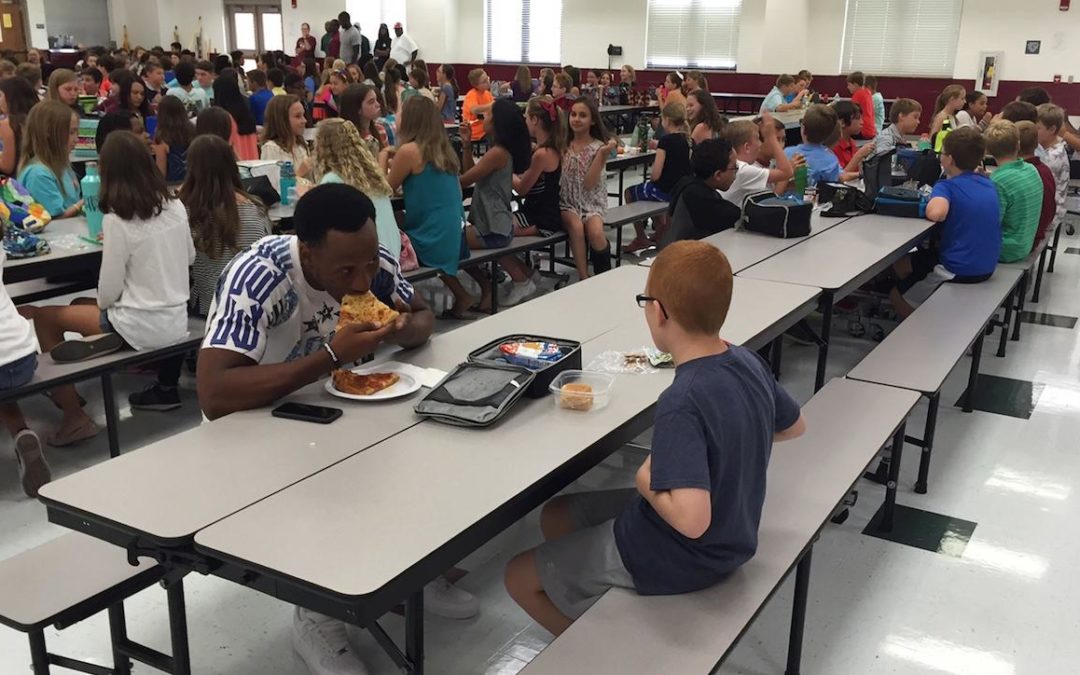Guidance Center Holds Ladies Night Out
Blank Slate Papers, August 4, 2017



September marks the start of another new school year and, for football diehards, it’s also the kickoff to a new season. The flowing together of the two brings to mind the moving story of former Florida State University (FSU) wide receiver Travis Rudolph and Bo Paske, a sixth grade boy with autism.
At the start of the school year in 2016, Rudolph and several teammates visited Montford Middle School in Tallahassee, located near the FSU campus. When Travis spotted 11-year-old Bo sitting alone in the cafeteria, he walked over with his slice of pizza, joined him, and struck up a conversation.
Travis’ simple act of kindness drew national attention when a photo of the two sitting across from one another went viral. Bo described the lunch as “kind of like me sitting on a rainbow.” Travis remarked: “A lot of people give me credit for doing what I did, even though I just see it as that is me.”
Bo told Travis that he was a big FSU fan. The two of them stayed in touch after their first encounter.
Leah Paske, Bo’s mom, wrote about it on Facebook: “Several times lately I have tried to remember my time in middle school. Did I have many friends? Did I sit with anyone at lunch? Just how mean were kids really? Now that I have a child starting middle school, I have feelings of anxiety for him, and they can be overwhelming. Sometimes I’m grateful for his autism. That may sound like a terrible thing to say, but in some ways I think, I hope, it shields him. He doesn’t seem to notice when people stare at him when he flaps his hands. He doesn’t seem to notice that he doesn’t get invited to birthday parties anymore. And he doesn’t seem to mind if he eats lunch alone.”
She went on to say, “A friend of mine sent this beautiful picture to me today and when I saw it with the caption ‘Travis Rudolph is eating lunch with your son’ I replied ‘Who is that?’ He said ‘FSU football player,’ then I had tears streaming down my face. I’m not sure what exactly made this incredibly kind man share a lunch table with my son, but I’m happy to say that it will not soon be forgotten. This is one day I didn’t have to worry if my sweet boy ate lunch alone, because he sat across from someone who is a hero in many eyes.”
Difference and inclusion are terms that are increasingly in vogue in today’s public schools. Growing numbers of children who were previously separated in special education classes and schools are being integrated into the “mainstream” in order to reduce costs and provide less restrictive environments for learning and social-emotional development.
Labeled children, particularly as they approach adolescence, are often objectified, devalued, isolated and ridiculed by their peers. Objectification robs individuals of their humanity. In such relationships the different child simply becomes “the other,” the one too often left out in the cold.
In an era when there seems to be no shortage of awful stories generating from college campuses, the story and photo of Travis and Bo is a breath of fresh air. Henry James said that “a good story is both a picture and idea, and that the picture and the idea should try to be interfused.”
The picture of Travis joining Bo at the lunch table tells us that a simple act of kindness can go a long way to making a difference in someone’s life. We learned from Travis that what it takes is just a little effort—and an abundance of heart.
Andrew Malekoff is the Executive Director of North Shore Child & Family Guidance Center, which provides comprehensive mental health services for children from birth through 24 and their families. To find out more, visit www.northshorechildguidance.org.


Every parent has the intentions of raising their child in the best way possible. However, not every parent has the same ideologies for what the best way really is. Parents’ differences in opinions can lead to bickering and competitive tension. This is commonly referred to as “mommy wars”, but for the sake of progressive times, we will refer to it as “mommy/daddy wars.”
Whether you are about to have your first child, or you have had multiple children, every parent can say that they have experienced this in one way or another. Some instances of mommy/daddy wars include the debates between the following:
The list could go on and on for forever. However, it is important to note that parenting is an individualized experience in which each parent has both the right and the capacity to make the choices that they feel are best for their family.
Though it can be hard to let others’ comments and opinions roll off your shoulders, it’s an important skill to master as a parent because these stresses and pressures will continue throughout the child’s life. Facing these difficulties offers parents a great opportunity to model flexibility for their kids, despite the challenge is also presents.
At the Guidance Center, we are familiar with the challenges of parenting and can help through the Diane Goldberg Maternal Depression Program, which provides rapid response and diagnosis for mothers suffering from maternal post-partum depression and other perinatal mood disorders. Vanessa McMullan, LCSW, Supervisor, The Marks Family Right From The Start 0-3+ Center, stated that, “There are so many external pressures in a mother’s life that come from family, friends, peers, and social media that it creates a negative impact on their mood. Every mom wants to do what they think is right, but when they are told that they are wrong, it causes them to feel disappointed, confused, lost, and even inadequate. These feelings sometimes result in a lack of communication about their stress.”
If you’re in need of support, contact the Guidance Center at 516-626-1971. Our trained clinicians can help you navigate any parenting struggles you may be experiencing, and our Parent Advocates can impart their wisdom for future parenting success.

As Purposeful Parenting month comes to an end, and as back to school is near, it is important to consider the time that is spent with your children. Storytelling is a great way to pass the time as well as bond with one another.
Begin by finding an environment that is conducive to good conversation. Share stories with your children about your childhood, and what life was like for you when you were their age. In exchange, ask them to share some of their stories with you.
Storytelling is important for children of all ages. It allows them to understand their own and their family’s past and present. In addition, “storytelling is cozy, constructive, and a win-win for parent and child alike.” (Gelb, 2015).
Shared stories can address the varying emotions that everyone faces in their lives. By exploring these elements of your shared lives, you will create a connection with one another. This connection will then help to build trust between you and you children. That trust will make the transition into more difficult conversations, such as conflict-laden relationships with peers, easier on both of you. As you enter into a new school year, be sure to discuss bullying with your children.
As storytelling becomes part of the routine in your household, you will be laying the foundation for your child to become more comfortable sharing the positive and negative aspects of their life with you.
If you or your child is in need of support, contact the Guidance Center at 516-626-1971. Our trained clinicians can help you navigate any struggles that you may be experiencing.
Gelb, A. (2015, September 24). The Lifesaving Power of Storytelling. Retrieved July 26, 2017, from http://www.thedailybeast.com/the-lifesaving-power-of-storytelling
In a four year span during the mid to late 1990s my now-grown children lost three of their grandparents and their dog. My boys were 10 and 6 when my father died in 1994. Three years later there were three more losses. My mom died in 1997. A little more than one year later my father-in-law and dog Kirby, a cairn terrier, died on the same day in August 1998. My wife and I were in Quebec City at a music festival, at the time, on our first extended vacation away from our children when we received the news in two heartbreaking telephone calls just six hours apart.
As a mental health professional who has spent time with bereaved children and adults over many years, I had extensive knowledge about how children process death at different ages. Over the years I developed good skills in listening and gently encouraging the expression of feelings through talk and play. But I also knew that addressing the death of strangers was not the same thing as coping with one’s own losses.
Like so much that I have struggled with as a parent, I knew I had to put my credentials aside and simply do the best I could to support my family and take care of myself, as I was bereaved as well.
Soon thereafter my family and I experienced another death—this time with an impact I had not expected and effects that linger to this day. In our yard was an old pine tree that had to be felled after it contracted a disease. None of the tree “experts” that I employed could bring it back to health.
It was a splendid tree of great character, oddly shaped, home to a squirrel’s nest and countless birds, and with branches sitting low enough for swinging and climbing. Its trunk was thick enough to run around to evade contact during games of tag. It was free enough of branches in one high spot to support a backboard and hoop.
It wasn’t easy to dribble on the grass but it was just perfect for endless games of H-O-R-S-E. On the warmest summer days its shade offered respite from the oppressive sun. Each fall I was left with the unpleasant task of raking pine needles. But our tree also bore pine cones that I threw into the winter fireplace for extra snap, crackle and pop that rivaled Rice Krispies.
It was our family tree, a tree for all seasons.
Today, when I look outside or sit in the yard I am flooded with memories of my old friend and the times we had together. We’ve planted a few new trees around the perimeter of the yard in the intervening years, but the hole in the center remains.
Henry David Thoreau wrote, “I frequently tramped eight or ten miles through the deepest snow to keep an appointment with a beech-tree, or a yellow birch, or an old acquaintance among the pines.”
Life is full of surprises, and it came as a surprise to me to think that I would one day be thinking about how much I really loved that old tree.
Andrew Malekoff is the Executive Director of North Shore Child & Family Guidance Center, which provides comprehensive mental health services for children from birth through 24 and their families. To find out more, visit www.northshorechildguidance.org.
